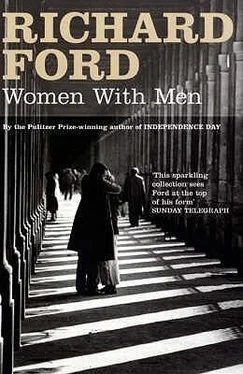Richard Ford - Women with Men
Здесь есть возможность читать онлайн «Richard Ford - Women with Men» весь текст электронной книги совершенно бесплатно (целиком полную версию без сокращений). В некоторых случаях можно слушать аудио, скачать через торрент в формате fb2 и присутствует краткое содержание. Год выпуска: 2006, Издательство: Bloomsbury Publishing PLC, Жанр: Современная проза, на английском языке. Описание произведения, (предисловие) а так же отзывы посетителей доступны на портале библиотеки ЛибКат.
- Название:Women with Men
- Автор:
- Издательство:Bloomsbury Publishing PLC
- Жанр:
- Год:2006
- ISBN:нет данных
- Рейтинг книги:3 / 5. Голосов: 1
-
Избранное:Добавить в избранное
- Отзывы:
-
Ваша оценка:
- 60
- 1
- 2
- 3
- 4
- 5
Women with Men: краткое содержание, описание и аннотация
Предлагаем к чтению аннотацию, описание, краткое содержание или предисловие (зависит от того, что написал сам автор книги «Women with Men»). Если вы не нашли необходимую информацию о книге — напишите в комментариях, мы постараемся отыскать её.
Women with Men — читать онлайн бесплатно полную книгу (весь текст) целиком
Ниже представлен текст книги, разбитый по страницам. Система сохранения места последней прочитанной страницы, позволяет с удобством читать онлайн бесплатно книгу «Women with Men», без необходимости каждый раз заново искать на чём Вы остановились. Поставьте закладку, и сможете в любой момент перейти на страницу, на которой закончили чтение.
Интервал:
Закладка:
With Margie McDermott, the liaison had ended just as it had begun — undramatically though suddenly, and without a great deal of comment. One day they met in a sub shop in the next river town down from Wilmot, decided it was all over and that they were both headed straight for big, big trouble if they didn't cease right then. They looked toward each other across a raised Formica table, proclaimed they were both better served by marriage than by adultery and smart as whips for knowing it so soon. At the end of a brief lunch they got in their separate cars and drove away in opposite directions, feeling — Matthews had been certain — immensely relieved to have dodged the bullets they'd dodged.
In six months, of course, Margie had abandoned her husband, Parnell, and in a year Penny had abandoned Matthews. If they'd only recognized that likelihood, Matthews had often thought, they could at least have kept doing what they'd been doing and enjoyed life a little longer before the curtain slammed down on both their acts.
Margie McDermott had gone directly to Paris, leaving her three children stranded in Ohio with her husband. It turned out she had a former boyfriend from Oberlin who survived in Paris as a painter, someone she had not been in touch with for years but who'd told her she could always come to him if times got tough — which they were. Margie moved in with Lyle and his girlfriend, Brigitte, for six months, tried all kinds of jobs, searched for an apartment, studied French, borrowed money from Parnell, plus some from Parnell's parents, and at long last and after several false starts and tragedies found a job working as a receptionist for American Express, making four hundred dollars a week.
All this Margie had written to Matthews — in a letter that came out of the blue to his new address on the woodsy east edge of Wilmot. He had no idea how she'd found him or why she wanted to be in touch or explain her situation at any length. They had never passed another word once their cars had departed the sub shop on the Marietta highway in nineteen ninety-something. Once or twice he'd seen Parnell at the farmers’ market on Saturday morning, looking forlorn and deviled, surrounded by unhappy kids who all, it seemed to Matthews, looked like the absent Margie and not a bit like Parnell.
In Margie's letter, though, had been an invitation that Matthews seek her out should he ever find himself in Paris. She could, her letter said, now cook an excellent coq-au-vin, and she had always felt “totally sorry” she'd never “in the midst of all that crazy time” cooked him “a proper meal” Matthews could “sit down to and eat like a civilized human being.” She'd enclosed an address and a phone number. “Mine is a poor flat in a very chic neighborhood. The 6th Arrondissement.” He had never responded.
He had, however, tried to picture Margie McDermott, who'd been a thin, small-boned, sallow-faced, delicately pretty brunette who wore corduroy skirts and blue stockings and always seemed passive and accepting and slightly defeated by life but who apparently wasn't at all. (You could never predict these things.) He'd pictured her first in Ohio and then in Paris — in settings he could only make up. But it wasn't, he'd decided, an improbable transition to accept: Ohio to Paris. Though he'd imagined that a difficult, somewhat straitened existence as a receptionist at American Express, instead of as the unhappy, adulterous wife of a history professor and mother of three, would probably work out to accentuate Margie's sallow and defeated sides rather than the adventurous, no-holds-barred, narrow-eyed, nobody's-fool aspects she'd set free in the back of his Mazda.
In any event, he had thought while planning the trip that it was worth a phone call, possibly even a brief visit, though he'd imagined he'd never get out of Helen's sight long enough, in which case it wouldn't matter. He had no idea why he might want to see Margie McDermott, since he hadn't wanted to see her since the last time. His only thought was that he wanted to see her simply because he could, and because this was Paris, and visiting a woman in Paris, even a woman he didn't much want to see, had never happened to him in all of life.
The rue d'assas, at its intersection with the rue de Vaugirard, offered an obvious turning and an invitation to wander back toward the Luxembourg and resume a remnant of his original scheme. But he had lost the taste for sightseeing and felt more purposeful to find a phone and call Margie McDermott, who must live somewhere quite close by, though he couldn't find her street — rue de Canivet, or possibly Canivel — in the Fodor's. Perhaps it was too small to show up.
He made straight out for the busy commercial avenue, which was rue de Rennes, which he could see on the map, leading toward St.-Sulpice or close at least to a connecting street, which seemed in fact to be rue du Vieux-Colombier, where the famous club was and where he was sure he'd find a phone.
Now was the beginning of the last weekend before Christmas, and the warmer weather and sudden sunshine had pushed Parisians out onto the damp sidewalks, crowding around the windows of stores where there must've been sales in progress and standing in line for buses to take them somewhere else, where there were even better bargains. He wondered if here was the true center of Paris, the official downtown recognized by all, or if Paris never had a downtown and was actually just a series of villages connected over time by commerce — like London. These were facts he'd eventually know. It could be that downtown was an American idea, something the French would all laugh at if they knew what he was thinking as he plowed along the crowded sidewalk. Ahead of him, down the long, descending avenue (sloping toward the Seine, he was sure), was St.-Germain-des-Prés and, he'd deduced, the Deux Magots, the Brasserie Lipp, the Café de Flore — one of the great confluences of Europe. There was no more famous place. Descartes was buried in the church. It would have to be the center of something.
At the corner of rue de Mézières he found a public phone outside a tabac, where workingmen stood at a long bar having coffees and smoking cigarettes. This phone accepted no coins, but Helen's travel agent had thought ahead and supplied two phone cards for emergencies, and she'd given him one at the Pittsburgh airport.
The card clocked up fifty crisp little units of something on the pale-green coin box window. Rue de Mézières had begun funneling a damp, bristling wind, and looking straight into it, Matthews could see one pale rounded tower of what must've been the St.-Sulpice church. It was colder, he felt, nearer the river — just like everywhere else.
He had no idea what to expect by calling, and it was tempting just to forget the whole idea. There wouldn't be time to see Margie unless she happened to live a half block away from where he was standing — which was of course possible. On the other hand, Margie could be different now. What he'd finally found uninteresting and going-nowhere about her in an Ohio college town (and no doubt she'd found the same about him) might be changed in Paris. Something locked away due to circumstance, that inhibited everyone's view of everything and everybody, might have opened up here. All kinds of things were now possible. At the very least, they could restore contact (she had written him), have coffee at the Deux Magots or step right inside the tabac, maybe set a plan in motion for his eventual return. Or in five minutes she could appear, breathless, expectant, wearing little other than a green cloth coat. After which they could hurry back to her “poor flat,” and he wouldn't return to the Nouvelle Métropole until after dark, and possibly never. This, of course, wasn't feasible, given Helen's condition. But there'd been a moment, leaving the toy store, when he'd thought about not coming back, just having a long lunch alone, buying the cigar he'd imagined and setting off on a very, very long walk.
Читать дальшеИнтервал:
Закладка:
Похожие книги на «Women with Men»
Представляем Вашему вниманию похожие книги на «Women with Men» списком для выбора. Мы отобрали схожую по названию и смыслу литературу в надежде предоставить читателям больше вариантов отыскать новые, интересные, ещё непрочитанные произведения.
Обсуждение, отзывы о книге «Women with Men» и просто собственные мнения читателей. Оставьте ваши комментарии, напишите, что Вы думаете о произведении, его смысле или главных героях. Укажите что конкретно понравилось, а что нет, и почему Вы так считаете.












